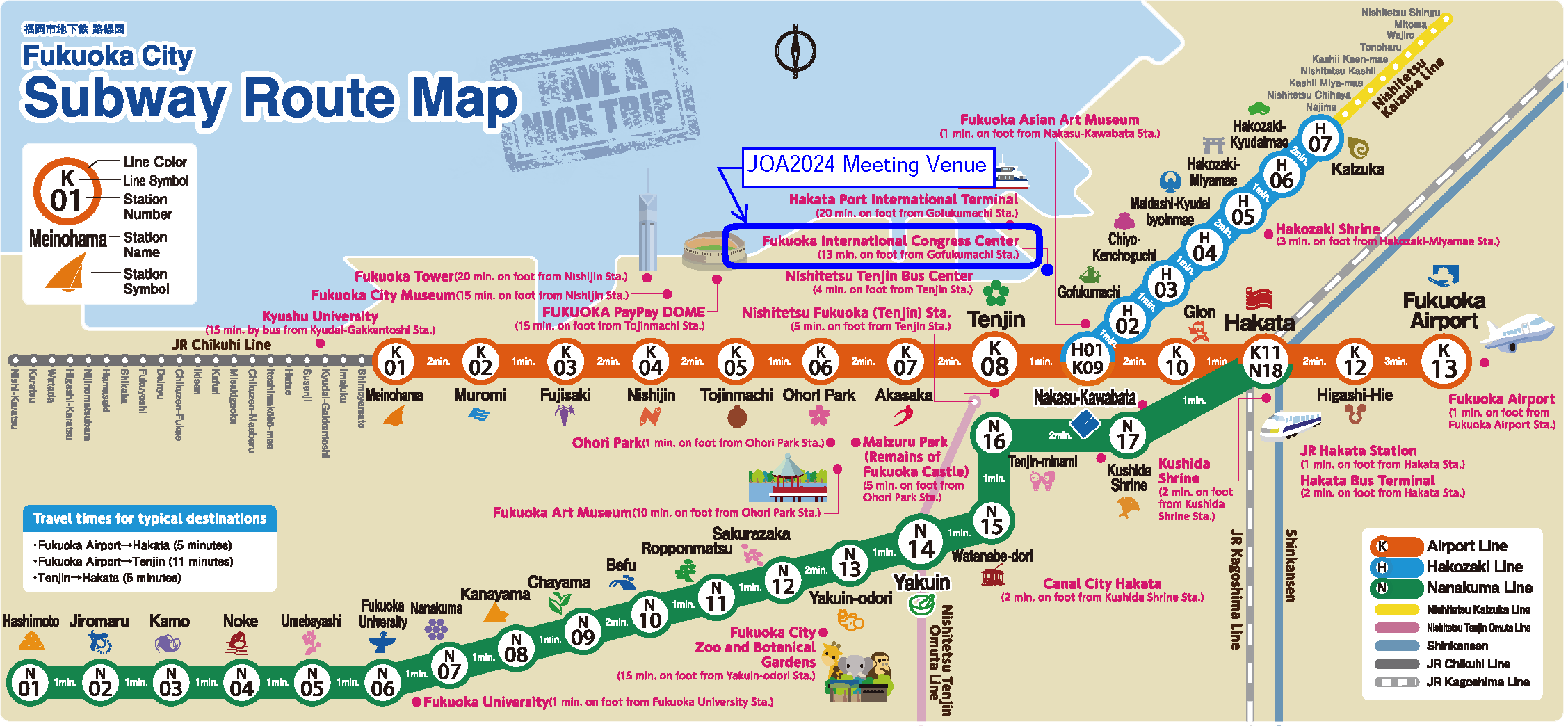
Host Organization
Department of Orthopaedic Surgery
Keio University School of Medicine
35 Shinanomachi, Shinjuku-ku, Tokyo, 160-8582, Japan
Congress Secretariat
Congrès Inc.
Onward Park Building 3-10-5 Nihonbashi, Chuo-ku Tokyo
103-8276, Japan
E-mail: joa2024@congre.co.jp
Information for Participants
About Fukuoka:
Great food and even better company reign supreme in Fukuoka, the relaxed port town at the heart of life on Kyushu, Japan's third-largest island. The city is the fastest growing in Japan and has engaged in cultural exchange throughout its history due to its proximity to mainland Asia.
Fukuoka is Japan's fifth largest city and is nestled on the northern coast of Kyushu. The city is loosely divided into two halves, Hakata and Tenjin, with the island of Nakasu in the middle. Formerly these areas used to be two separate cities: the merchant town of Hakata to the east and the castle town of Fukuoka (which included Tenjin) to the west. The cities merged in 1889 to create the modern city of Fukuoka.
The city has good local public transport with a rapid subway system and well-connected local buses. For more regional travel within Kyushu and Japan, Hakata Station is the main point of focus, with a large bus terminal and Fukuoka City's bullet train station.
The airport is conveniently located, and travel to the city center by subway from the domestic terminal takes only five to six minutes. Regular bus services also run to the airport, connecting it to both the city and the rest of Kyushu.
Weather in Fukuoka in May:
May sees Fukuoka in full spring glory, with weather conditions leaning towards the hotter end of the spectrum. The average high-temperature in Fukuoka mildly increases in May, edging from a refreshing 19.2°C (66.6°F) in April to a moderately hot 23.5°C (74.3°F). Fukuoka experiences a steady low-temperature of 15°C (59°F) throughout May. The average relative humidity in May is 69%.
Currency:
The official currency in Japan is the yen. You can obtain yen at currency exchange counters located in major airports worldwide, including Haneda and Narita International Airports, as well as currency exchange outlets in Tokyo. For your convenience, exchanging currency at the airport is recommended. Most major foreign currencies and travelers' checks can be exchanged at banks and hotels during your stay. However, we strongly advise purchasing travelers' checks or obtaining cash in yen or U.S. dollars before departing from your home countries. Please note that a passport may be required for currency exchange services.
Credit Card:
Most hotels, major department stores and restaurants accept VISA, Master, JCB, Amex and Diners. However, some shops do not accept credit cards. It is advisable to bring a certain amount of cash.
ATM:
Many automatic teller machines (ATMs) in Japan do not accept credit, debit, and ATM cards, which are issued outside of Japan, with the exception of those found at post offices and 7-Eleven convenience stores. These ATMs provide an English user menu and allow you to withdraw cash using credit and debit cards issued outside of Japan, including Visa, Plus, Mastercard, Maestro, Cirrus, American Express, and JCB cards. Additionally, international ATMs can be found at international airports and major department stores.
Business Hours:
| Banks: | 9:00 – 15:00 (closed on Saturday and Sunday) |
|---|---|
| Money Exchange: | Hours vary depending on the ATM service at Airport Please check the link below: https://www.fukuoka-airport.jp/en/service/bank/ |
| Supermarket: | Mostly open 9:00 – 20:00 (hours vary depending on the store) |
| Convenience Stores: | Mostly open 24 hours (hours vary depending on the store) |
| Post Offices: | 9:00 – 17:00 (closed on Saturday and Sunday) |
| Department Stores: | 10:00 – 19:30 (7 days a week) |
| Restaurants: | Some open 24 hours, some open 9:00 – 23:00 (hours vary depending on the restaurant) |
Electricity:
Voltage in Japan is 100V A.C. and use a 2-flat-pin plug Type-A. Finding 3-pin compatible sockets at 120V, 200V, and 220V is difficult. An adapter is advised for using electrical equipment.
Water:
Tap water is safe to drink anywhere in Japan unless stated otherwise. Additionally, mineral water can be purchased at convenience stores, supermarkets, kiosks, etc.
Smoking:
Smoking is prohibited inside most buildings and stations, except in designated smoking areas. Additionally, smoking in pedestrian areas around Tokyo Station is prohibited.
Visa:
Please refer to the website of the Ministry of Foreign Affairs of Japan.
http://www.mofa.go.jp/j_info/visit/visa/Tax:
Consumption tax is currently at a rate of 10%, and prices shown on price tags generally include tax.
Tipping:
Tipping is not common in Japan and is not generally practiced in any situation.
Public Transportation:
Fukuoka city offers a convenient subway system and several different railway lines to swiftly take you to your destination.

For more details, please refer to the following websites.
https://www.japan-guide.com/list/e1108.html© 2023 The 97th Annual Meeting of the Japanese Orthopaedic Association.
© 2023 The 97th Annual Meeting of
the Japanese Orthopaedic Association.





